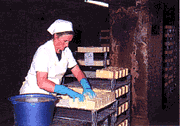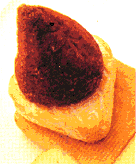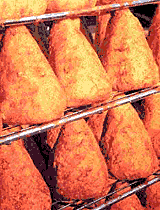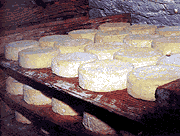Cheeses
![]()

Julian
Lucas -
your guide to eating on theotherside
|
Maroilles
|
Artisinal producers France's finest speciality
cheeses Maroilles has been made since the 12th century - they make it in squares from local cows milk. It's soft and moist with a tangy flavour and quite a string smell. The Abbey of Maroilles near Avesnes used to collect its dues (tithes) from local peasants in cheese, which the monks then matured for at least 3 months in the abbey cellars. During this time each cheese is individually brushed with salt water so the orange rind and special flavour develops. Today the monks' tradition is carried on
by one local farm, the Ferme du Verger Pilote - which
(for best flavour) uses only the unpasteurised milk from its
own herd of 120 Friesian dairy cows. Local
variations of Maroilles |
|
|
Sire
de Crecuy The rounds of cheese made from
unpasteurised cows' milk are also "rind-washed" - that is,
regularly brushed with salt water while they mature for 2
months in the farm's cellar. |
 Cheese shop cellar - managing the ripening stock is a key part of giving you a new “cheese” experience... |
Specialist cheese
shops - fromageries |
|
Places
to visit: List of cheese-making dairies you can visit. |
|
|
Related background
information |
|
|
|
|
|



